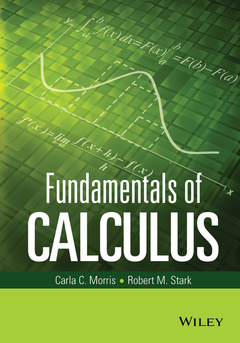Description
Fundamentals of Calculus
Authors: Morris Carla C., Stark Robert M.
Language: English
Subject for Fundamentals of Calculus:
131.29 €
In Print (Delivery period: 14 days).
Add to cart368 p. · 17.8x25.4 cm · Hardback
Description
/li>Contents
/li>Biography
/li>
Features the techniques, methods, and applications of calculus using real-world examples from business and economics as well as the life and social sciences
An introduction to differential and integral calculus, Fundamentals of Calculus presents key topics suited for a variety of readers in fields ranging from entrepreneurship and economics to environmental and social sciences.
Practical examples from a variety of subject areas are featured throughout each chapter and step-by-step explanations for the solutions are presented. Specific techniques are also applied to highlight important information in each section, including symbols interspersed throughout to further reader comprehension.
In addition, the book illustrates the elements of finite calculus with the varied formulas for power, quotient, and product rules that correlate markedly with traditional calculus. Featuring calculus as the ?mathematics of change,? each chapter concludes with a historical notes section.
Fundamentals of Calculus chapter coverage includes:
- Linear Equations and Functions
- The Derivative
- Using the Derivative
- Exponents and Logarithms
- Differentiation Techniques
- Integral Calculus
- Integrations Techniques
- Functions of Several Variables
- Series and Summations
- Applications to Probability
Preface ix
About the Authors xiii
1 Linear Equations and Functions 1
1.1 Solving Linear Equations 2
1.2 Linear Equations and their Graphs 7
1.3 Factoring and the Quadratic Formula 16
1.4 Functions and their Graphs 25
1.5 Laws of Exponents 34
1.6 Slopes and Relative Change 37
2 The Derivative 43
2.1 Slopes of Curves 44
2.2 Limits 46
2.3 Derivatives 52
2.4 Differentiability and Continuity 59
2.5 Basic Rules of Differentiation 63
2.6 Continued Differentiation 66
2.7 Introduction to Finite Differences 70
3 Using The Derivative 76
3.1 Describing Graphs 77
3.2 First and Second Derivatives 83
3.3 Curve Sketching 92
3.4 Applications of Maxima and Minima 95
3.5 Marginal Analysis 103
4 Exponential and Logarithmic Functions 109
4.1 Exponential Functions 109
4.2 Logarithmic Functions 113
4.3 Derivatives of Exponential Functions 119
4.4 Derivatives of Natural Logarithms 121
4.5 Models of Exponential Growth and Decay 123
4.6 Applications to Finance 129
5 Techniques of Differentiation 138
5.1 Product and Quotient Rules 139
5.2 The Chain Rule and General Power Rule 144
5.3 Implicit Differentiation and Related Rates 147
5.4 Finite Differences and Antidifferences 153
6 Integral Calculus 166
6.1 Indefinite Integrals 168
6.2 Riemann Sums 174
6.3 Integral Calculus – The Fundamental Theorem 178
6.4 Area Between Intersecting Curves 184
7 Techniques of Integration 192
7.1 Integration by Substitution 193
7.2 Integration by Parts 196
7.3 Evaluation of Definite Integrals 199
7.4 Partial Fractions 201
7.5 Approximating Sums 205
7.6 Improper Integrals 210
8 Functions of Several Variables 214
8.1 Functions of Several Variables 215
8.2 Partial Derivatives 217
8.3 Second-Order Partial Derivatives – Maxima and Minima 223
8.4 Method of Least Squares 228
8.5 Lagrange Multipliers 231
8.6 Double Integrals 235
9 Series and Summations 240
9.1 Power Series 241
9.2 Maclaurin and Taylor Polynomials 245
9.3 Taylor and Maclaurin Series 250
9.4 Convergence and Divergence of Series 256
9.5 Arithmetic and Geometric Sums 263
10 Applications to Probability 269
10.1 Discrete and Continuous Random Variables 270
10.2 Mean and Variance; Expected Value 278
10.3 Normal Probability Density Function 283
Answers to Odd Numbered Exercises 295
Index 349
CARLA C. MORRIS, PhD, is Assistant Professor of Mathematics in the Associate in Arts Program at the University of Delaware. A member of The Institute for Operations Research and the Management Sciences and the Mathematical Association of America, Dr. Morris teaches courses ranging from college algebra to calculus and statistics.
ROBERT M. STARK, PhD, is Professor Emeritus in the Departments of Mathematical Sciences and Civil and Environmental Engineering at the University of Delaware. Dr. Stark's teaching and research interests include applied probability, mathematical optimization, operations research, and mathematics education.
These books may interest you

Fundamentals of Calculus Set 147.98 €



